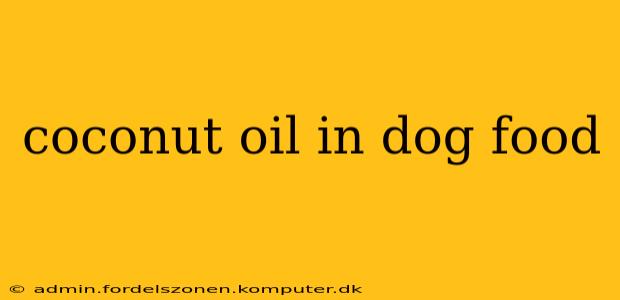Coconut oil has gained popularity as a purported health supplement for humans, and its benefits for canine companions are also frequently touted. But is adding coconut oil to your dog's food truly beneficial, or is it just another trendy pet food additive? Let's delve into the facts to help you make an informed decision.
Is Coconut Oil Good for Dogs?
The short answer is: it can be, but with caveats. Coconut oil contains medium-chain triglycerides (MCTs), which are easily digested and quickly converted into energy. Some studies suggest MCTs can offer certain health benefits for dogs, including improved skin and coat condition, boosted immunity, and potentially even aid in weight management. However, it's crucial to remember that these are potential benefits, and more research is needed to definitively confirm their efficacy in dogs. The amount and type of coconut oil are also crucial factors.
What are the Benefits of Coconut Oil for Dogs?
Several potential benefits are associated with adding coconut oil to a dog's diet, though always consult your veterinarian before making dietary changes:
-
Improved Skin and Coat: The fatty acids in coconut oil can help moisturize dry skin and promote a healthier, shinier coat. This is particularly beneficial for dogs with skin conditions like eczema or allergies.
-
Enhanced Immunity: Some evidence suggests that coconut oil may have antimicrobial properties that can support the immune system. However, it's not a replacement for vaccinations or other preventative healthcare measures.
-
Improved Digestion: The MCTs in coconut oil are easily digestible, making it potentially beneficial for dogs with digestive sensitivities.
-
Weight Management (Potentially): While not a miracle weight-loss solution, the energy boost from MCTs might contribute to increased activity levels and potentially aid in weight management when combined with a balanced diet and exercise.
-
Cognitive Function (Limited Evidence): Some anecdotal evidence suggests it may improve cognitive function in senior dogs, but further research is needed.
What are the Risks of Giving Coconut Oil to Dogs?
While generally safe in moderation, there are potential risks associated with feeding coconut oil to dogs:
-
Weight Gain: Coconut oil is high in calories. Overfeeding can lead to weight gain, just like any other high-calorie food.
-
Diarrhea: Some dogs may experience digestive upset, including diarrhea, particularly if given large amounts or if they are sensitive to fats.
-
Pancreatitis (Rare but Serious): In rare cases, high-fat diets can trigger pancreatitis, a serious inflammation of the pancreas. This is more likely in dogs with a predisposition to pancreatitis.
-
Interactions with Medications: Coconut oil may interact with certain medications. Always consult your veterinarian before adding it to your dog's diet, especially if your dog is on any medication.
How Much Coconut Oil Should I Give My Dog?
There's no universally agreed-upon amount. The appropriate dosage depends on your dog's size, weight, and health condition. A general guideline is to start with a small amount (a teaspoon or less for small dogs, a tablespoon or less for larger dogs) and gradually increase it over several days, monitoring for any adverse effects. Always consult your veterinarian to determine the safe and appropriate amount for your dog.
What Type of Coconut Oil is Best for Dogs?
Choose unrefined, virgin coconut oil. Avoid coconut oil that has been processed or contains additives. Refined coconut oil has been treated to remove some of its beneficial compounds.
Can I Give My Dog Coconut Oil Every Day?
Daily supplementation is generally not recommended without veterinary guidance. It's better to give it intermittently or as needed, perhaps a few times a week, rather than every day.
Is Coconut Oil Toxic to Dogs?
Coconut oil itself is not toxic to dogs. However, excessive consumption can lead to the problems mentioned above. Moderation is key.
My Dog Ate Coconut Oil - What Should I Do?
If your dog has ingested a small amount of coconut oil, it's likely not a cause for concern. Monitor them for any signs of digestive upset (vomiting, diarrhea). However, if your dog has ingested a large amount, or if you are concerned, contact your veterinarian immediately.
This information is for educational purposes only and should not be considered veterinary advice. Always consult with your veterinarian before making any changes to your dog's diet, especially if they have any underlying health conditions. They can help you determine if coconut oil is appropriate for your dog and recommend the correct dosage.
